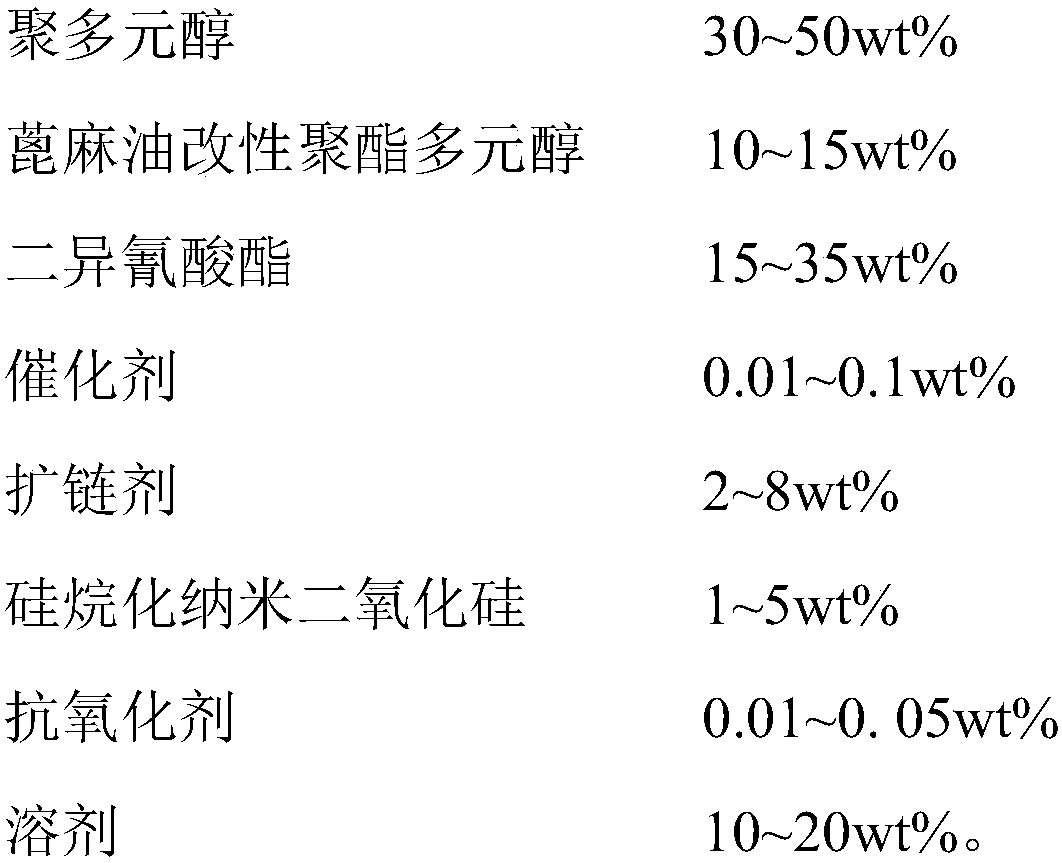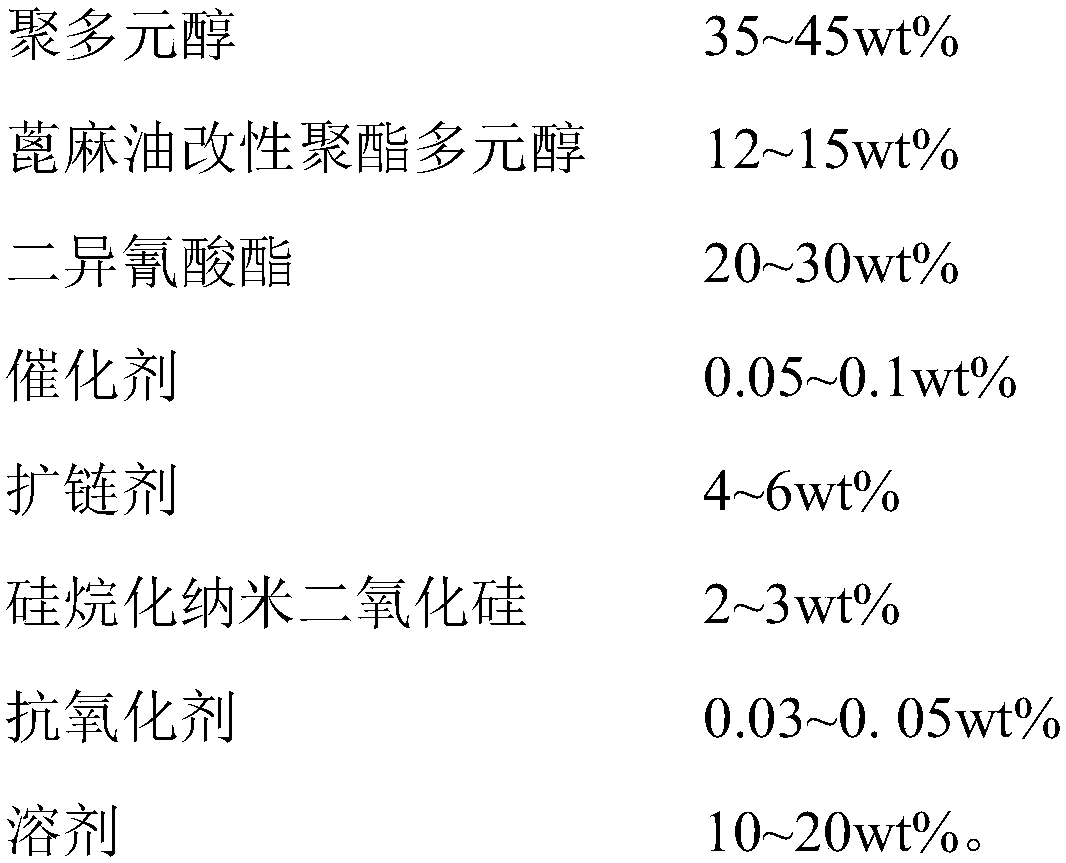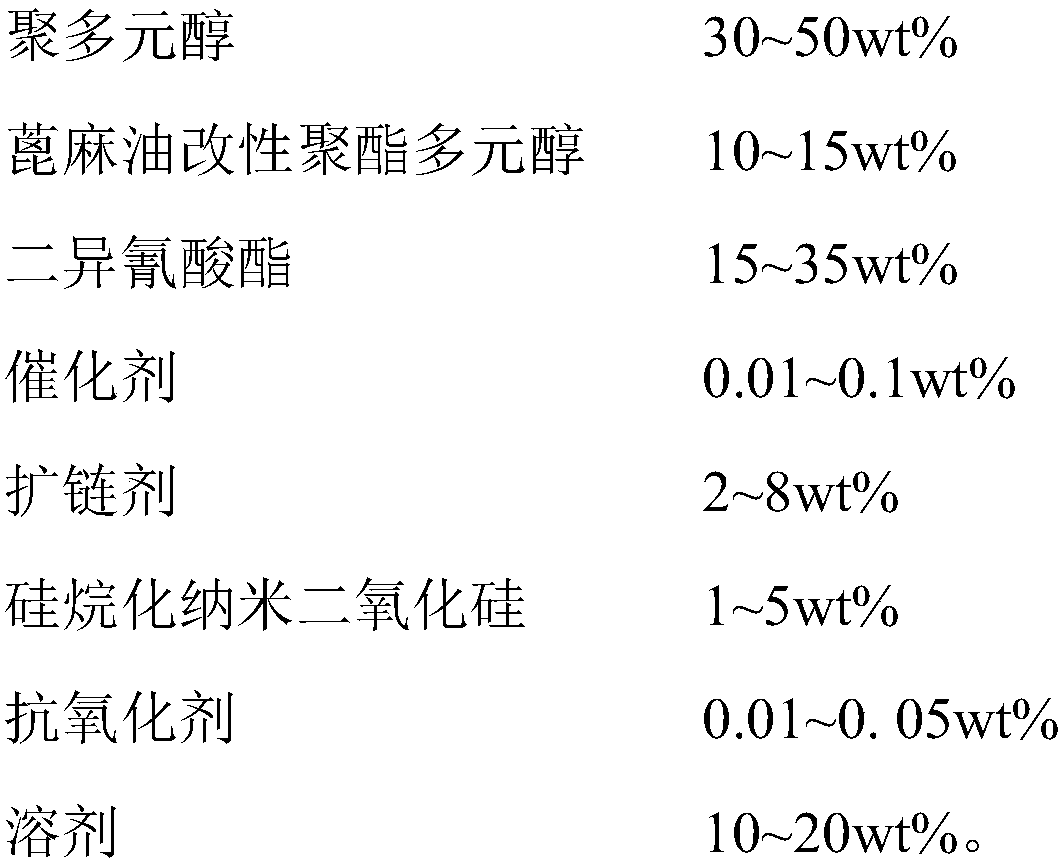Heat-resistant single-component moisture-curing polyurethane adhesive and preparation method and application thereof
A polyurethane adhesive, one-component technology, applied in the direction of non-polymer adhesive additives, adhesive additives, etc., can solve the problems of agglomeration, polymer performance decline, poor compatibility, etc. The effect of bonding strength and excellent bonding performance
- Summary
- Abstract
- Description
- Claims
- Application Information
AI Technical Summary
Problems solved by technology
Method used
Image
Examples
Embodiment 1
[0059] A heat-resistant one-component moisture-curing polyurethane adhesive and a preparation method thereof, mainly comprising the following steps:
[0060] (1) Synthesis of castor oil modified polyester polyol
[0061] Add 15g of castor oil, 25g of phthalic anhydride, 30g of diethylene glycol and 0.05g of catalyst methanesulfonic acid into a reaction kettle with nitrogen gas, and use toluene to separate the generated water and polyester polyols, and at 160°C After vacuum esterification and dehydration reaction for 2.5 hours, raise the temperature to 220°C, keep the head temperature not lower than 100°C for 5 hours, then place it in a vacuum drying oven at 50°C after cooling, and then obtain castor oil modified polyester polyol;
[0062] (2) Silanization modification of nano-silica
[0063] Take 11g of nano-silica and 14g of solvent N-methylpyrrolidone and mix them. After ultrasonic dispersion at room temperature for 1.5h, heat to 35°C, add 2g of γ-aminopropyltriethoxysilane...
Embodiment 2
[0068] A polyurethane adhesive for difficult-to-bond hardwoods and a preparation method thereof, mainly comprising the following steps:
[0069] (1) Preparation of Castor Oil Modified Polyols
[0070] Add 25g of castor oil, 35g of phthalic anhydride, 22g of ethylene glycol and 0.08g of catalyst methanesulfonic acid into a nitrogen-filled reactor, use toluene to separate the resulting water and polyester polyol, and perform vacuum esterification at 150°C After dehydration reaction for 3 hours, raise the temperature to 200°C, keep the head temperature not lower than 100°C for 5 hours, and then place it in a vacuum oven at 60°C to dry to obtain castor oil modified polyester polyol;
[0071] (2) Silanization modification of nano-silica
[0072] Take 12g of nano-silica and 16g of solvent N-methylpyrrolidone and mix them. After ultrasonically dispersing at room temperature for 2 hours, heat to 35°C, add 2.5g of γ-aminopropyltriethoxysilane to the reaction system, and react for 4 ho...
Embodiment 3
[0077] A polyurethane adhesive for difficult-to-bond hardwoods and a preparation method thereof, mainly comprising the following steps:
[0078] (1) Preparation of Castor Oil Modified Polyols
[0079] Add 20g of castor oil, 15g of phthalic anhydride, 18g of neopentyl glycol and 0.05g of catalyst methanesulfonic acid into a reaction kettle with nitrogen gas, and use butyl acetate to separate the generated water and polyester polyol. After vacuum esterification and dehydration reaction for 2 hours, raise the temperature to 200°C, keep the temperature of the distillation head not lower than 100°C for 4 hours, after cooling, put it in a vacuum drying oven at 40°C to dry to obtain castor oil modified polyester polyol;
[0080] (2) Silanization modification of nano-silica
[0081] Take 13g of nano-silica and 15g of solvent N-methylpyrrolidone and mix them, ultrasonically disperse them at room temperature for 1 hour, then heat to 35°C, add 2g of γ-aminopropyltriethoxysilane to the r...
PUM
 Login to View More
Login to View More Abstract
Description
Claims
Application Information
 Login to View More
Login to View More - R&D
- Intellectual Property
- Life Sciences
- Materials
- Tech Scout
- Unparalleled Data Quality
- Higher Quality Content
- 60% Fewer Hallucinations
Browse by: Latest US Patents, China's latest patents, Technical Efficacy Thesaurus, Application Domain, Technology Topic, Popular Technical Reports.
© 2025 PatSnap. All rights reserved.Legal|Privacy policy|Modern Slavery Act Transparency Statement|Sitemap|About US| Contact US: help@patsnap.com



